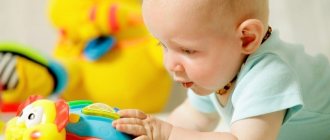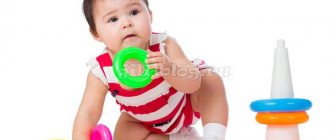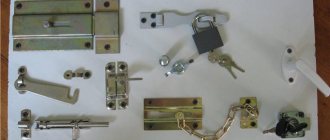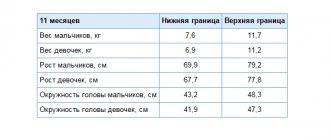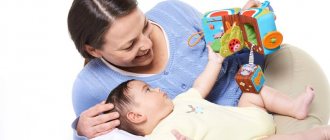A seven-month-old baby looks at the world with “new eyes” - he just recently learned to sit confidently and is already actively mastering crawling. Every day the baby learns a lot of new things and surprises his parents with his achievements.
Playing with a 7-month-old child significantly speeds up physical and mental processes, because it is with their help that the baby develops attentiveness, thinking skills, memory, etc.
What is the best time to play with your baby?
Games should help ensure that the child maintains an optimal daily routine. The basic rule: active activities should occur in the morning and afternoon, and quiet ones in the evening.
The ideal time for playing is considered to be those moments when the baby is full, has slept, and nothing bothers him.
Seven-month-old babies can do one type of exercise for no more than five minutes, so you shouldn’t concentrate on something for a long time. If it is noticeable that the baby is tired or capricious, then you can safely move on to another game.
What should a child be able to do at 9 months?
The baby's active development continues and, striving to achieve the unattainable, he pleases young parents with his new successes. From this age, the baby is already actively using play practice in communicating with the household members around him. A 9-month-old baby can already confidently hold toys in his hands, transferring them from one handle to the other, and even tries to grab small parts with his thumb and forefinger. Parental control is important here, because... interest in “taste acquaintance” with something new still remains, and small elements in the baby’s mouth are a direct danger to his health. The child now understands the differences between different objects, especially if during the game he hears comments from adults, the baby loves to throw, throw, roll his toys, because they are all so different from each other and each makes its own individual sound, and watch what is happening very exciting for a 9-month-old prankster. This new direction in play practice contributes to the active development of the baby’s speech and even greater understanding of adults. So, it is this age that is characterized by the baby’s first word – “mom”, “dad”. The child hears mentoring instructions from adults, understands the words “can” and “cannot”, but still continues to experiment with cause and effect. By this age, the first teeth appear - the central incisors, and in some, the lateral incisors. This way the baby looks even funnier and is very attractive to his family and friends, and the tireless attention of adults to their little child builds the child’s self-confidence and further rapid physical and mental development.
Developing your baby's intelligence
At 7 months, the child is actively exploring the surrounding space - the baby is interested in literally everything that comes in the way, so it is important to remove objects that could cause harm in a timely manner. Since the toddler already understands most of what his mother tells him, games at this age become truly interesting for both parties.
Available educational games for 7 month old babies at home:
- magic boxes . You need to take several boxes of different sizes and make small holes in them. Inside you need to place interesting objects (one at a time): a small mirror, a spoon, a rubber toy. The child takes out small things from the boxes, if possible, puts them back, and in the process the mother talks about the purpose of each of them;
- "guess where " To play, you can use the clenched fists of an adult, but it will be more interesting if you take two colored plastic glasses. They need to be turned over, hidden under one interesting small object. Quickly move containers around the table in a chaotic manner. The child’s task: guess where the “treasure” is hidden;
- "choose a toy " This is a simple but very exciting game aimed at developing mental functions. The child is given a toy in both hands, and then offered a third one. To take it, the baby has to let go of one of the first two;
- "pull and take" . You need to place a small but interesting toy for the baby on a napkin or scarf, so that he cannot reach it. Task: show the child that what he wants can be obtained by pulling the edge of the rag towards himself;
- "tower destruction" . Before the baby, you need to build structures from light cubes and let the baby destroy them;
- "hide and seek " You can hide bright objects under a diaper or a small blanket, and then give the baby the opportunity to find them. Mom can also hide, for example, around the corner, behind the playpen or behind the same fabric.
Don’t be upset if your baby can’t master this or that game yet—it won’t take long for him to do it.
Games to prepare for speaking
At the age of seven months, the child is practically on the threshold of speaking. He already babbles freely and for a long time, the pronounced syllables and sounds become more complex, their emotional and intonation coloring changes. Sometimes a baby manages to pronounce the first simple words “mom” or “dad,” but for now this happens unconsciously, and the sounds are not yet correlated with the object. Educational games for children in the seventh month of life will significantly accelerate the development of his speech skills.
- “World of Sounds” – trains the pronunciation of individual sounds and syllables. Attract the baby's attention; he should look at your face. Slowly say: “So-o-o-sun.” Oh-oh-oh-oh.”, clearly articulating at the same time. Take a break. Most likely, the baby will begin to repeat after you. Then tap the spoon, drawing attention to yourself: “Lo-o-ozhka.” Oh-oh-oh-oh.” And pause again, inviting the baby to dialogue.
- “Let's talk to a toy” - pick up any toy, for example, a kitten. Talk to the child on his behalf: “Hello, Maximka. How are you doing? Where's your mom? Where is your dad?". Take pauses between questions and give your child the opportunity to “answer.”
- "Sound accompaniment". When playing with your baby, voice your actions using simple syllables or individual sounds: “Here comes the cat: mur-mur. And this is a plane flying: w-w-w. The locomotive hums: tu-tu."
- “My first book” - try reading a short fairy tale to your child, for example, “Turnip”. Look at the pictures in the book, commenting on each of them.
- Tell short poems or nursery rhymes, sing songs.
When talking to children 7 months old, you need to pronounce each word clearly and slowly. “Lisping” and the constant use of diminutive forms are unacceptable - after all, it is at this stage that the child’s passive vocabulary is formed.
Contact your child more often with questions: “What are we going to do?”, “When will our dad return from work?”, “Shall we go to lunch?” And, after waiting some time, answer them yourself. This way, the baby will form a model of verbal communication, which he will use in the future.
Games for speech development
The child will master speech, in the full sense of the word, much later, but already now the baby is trying to repeat the easiest syllables and pronounce a variety of sounds. The baby can sing protractedly, gurgle, and otherwise attract the attention of adults.
Games at 7 months:
- onomatopoeia. When looking through books or pictures with images of animals, you need to tell how they “speak” (cat: “meow-meow”, duck: “quack-quack”, etc.). All objects in the house should be sounded in this way, that is, a “tick-tock” clock, a “knock-knock” hammer, etc.;
- conversations in children's language . You need to make eye contact with the baby and repeat sounds, for example, “ma-ma”, “ba-ba”, etc. After some time, the baby will begin to speak similarly;
- hearing development. Excellent hearing is the key to the fact that a child will understand all the sounds of his native speech, which means he will speak and write well and correctly in the future. To develop the skill, it is useful to sing songs and lullabies to your baby, speak with different intonations and volumes, and listen to music (works of the classics are especially useful);
- "who where?" . Speech development will be facilitated by memorizing the names of as many objects in the house as possible. To begin with, you should pay attention to the large and bright ones, then to the smaller ones. It is advisable that they always be in one place;
- toy phone . It can be helpful to say something into the phone and then ask your child to do the same.
The best “exercise” for developing a baby’s speech is long conversations with him. Words must be clearly pronounced and not distorted, and intonation and volume can be constantly changed.
By 7 months, the child becomes more active and stronger. He sits down without much difficulty and can sit without support; lying on his tummy, rolls over onto his back and tries to move on all fours. If you take him by the hands, he stands up, supported by the armpits, and tries to walk. Taking a rattle in his hand, he waves it and makes a rattle. Picks up a fallen toy. Violently expresses his emotions - he rejoices and smiles when he sees his mother.
At the 7th month of child development, the foundations of future words are laid. From ordinary vocalisms, the child moves on to syllables: “ba”, “ma”, “pa”, etc., i.e., in addition to vowels, he has already mastered some consonants. Watch him: he will pronounce a single syllable and freeze - listening. The baby, in turn, watches you carefully - how do you say? He watches your lips. Make sure your child sees your lips when you talk to him.
The sounds he utters do not yet carry any meaning. This is only a voice test, a test of the speech apparatus. It will take him a long time to learn to speak and memorize new words, and so far he is only at the beginning of this path. Fold your lips in a certain way, press your tongue to your gums and utter a certain sound - so curious. This is an entertaining game for a child. Take part in this game, set the tone for it.
When talking to your child, point to the objects you name. In the future, this knowledge will help the child speak faster. But don’t forget about a sense of proportion. Don't tire your baby too much. The limits of his capabilities are still very small. Working too actively with such a small child, trying to make him a child prodigy to please his own ambition, can only cause harm.
If you notice that your child has lost interest in the subject of the conversation, do not overdo it. The child was simply tired - he was filled to capacity with impressions. He needs some time to digest these impressions.
You have probably read a lot of literature about small children, you have friends with the same small children, or your friends have already raised their children and are now authoritatively telling you that your child at 7 months of age should be able to do this and that... And you seem to have noticed that your baby doesn’t know how to do this yet. Don't be upset, everything will come. Take a closer look at your child; perhaps he can do something that others cannot yet do. Every child is an individual from birth.
Main indicators of a child’s psychomotor development by 7 months:
1. The child can sit up independently and sit without outside support for several minutes.
2. Turns freely from back to side and back.
3. Firmly grabs objects of interest with his hand. Knocks, waving a rattle.
4. Confidently and with interest pronounces different sounds. He babbles for a long time.
5. Easily recognizes familiar faces.
6. Happy to make contact.
7. To the questions “Where is the clock?”, “Where is the bear?” finds with his gaze an object that is constantly in a certain place.
8. Crawls well.
Fun activities to develop fine motor skills
When a two or three year old child is brought to a specialist and the mother complains of lack of speech, the first thing the doctor will advise is to develop fine motor skills. To avoid facing a similar problem in the future, you can start doing exercises from a very early age.
The best educational games for a 7 month old baby:
- collecting small items . It is necessary to scatter beans, colored beads, pasta, etc., give the baby a bucket and ask him to collect the scattered things in a container;
- game with colored paper . It is necessary to give the child leaves. First, he will crumple them and examine them, and then tear off pieces. This activity is very useful for motor skills. It is worth understanding that plain paper will not work - it tears and wrinkles worse;
- drawing on flour or semolina, sorting through cereals . At the same time, you need to teach your baby to grab with a pinch (with three fingers);
- sorting through beads . It is desirable that they be multi-colored and large enough. You can purchase special children's beads and lacing;
- other . It is no less useful to play “Ladushki” and other folk nursery rhymes with your child.
Since babies under one year old still have poor finger control, it is useful to give children a massage that stimulates fine motor skills and manual dexterity.
A few exercises:
- dancing. It is necessary to bend and straighten your fingers on each handle several times. With a large one, carry out the following manipulations: lower it down, lift it up, move it in a circle;
- stroking. The baby should be gently guided along each hand towards the center (five to six times);
- open the baby's palm and make spiral movements from the center to the area located just above the base of the fingers. Repeat several times.
In close proximity to each other in the human brain there are two centers - the motor center, which is responsible for speech, and also the one that controls finger motor skills. Stimulation of the latter helps improve the baby’s intellectual, creative, thinking and other skills. This is why it is so important to do exercises to develop fine motor skills every day.
Games to stimulate crawling
Not all babies can crawl well at 7 months, but this skill is extremely important for the development of the musculoskeletal system.
There are several interesting games that will help you learn crawling faster:
- distillation. It is necessary to place the child’s favorite toys on one side of the carpet, and for mother and baby to sit on the other. An adult should show by example how to crawl correctly. It won't be long before fun racing is guaranteed;
- climb the mountain. The elevation can be a pillow or a removable part of the sofa. It needs to be placed on the floor, and a toy should be placed on the “mountain”, attracting the child’s attention. After he can climb, he also needs to carefully descend. Gradually, a whole labyrinth of such obstacles can be laid out on the floor;
- children love balls. You can roll them on the floor and ask the child to catch up with them. Instead of a ball, toys with a winding mechanism are suitable;
- You need to make an improvised gate from chairs, on one side of which you need to place a toy. The baby will have to crawl through the “gate” to get what he wants.
Without a sufficient level of physical activity, it is impossible to ensure normal intellectual, mental and other types of development.
Physical development at the eighth month
In the eighth month of life, a child’s physical activity increases: he already sits confidently, however, he is not yet able to sit up independently from a lying position. Crawls well - very quickly and in all possible directions, can crawl with an object in one hand.
Since the baby's muscles are significantly strengthened in the process of crawling, he will make frequent attempts to stand up, while using furniture for support to rise to a standing position. Stands independently at a support and walks holding onto it. Many babies can already walk by the hand. As soon as a child learns to stand up, he will want to check that he can not only stand on two legs, but also move his legs along the support, stomp his feet to music and dance.
The baby already has good control over his fingers and can grasp small objects using the thumb and forefinger; this grip is called a “tweezers” grip. At the first stage of forming this grip, the child grasps the object with the pads of his thumb and index finger. This grip is used when working with plasticine, when creating applications from paper, small household items and natural materials. At the second stage of developing a tweezer grip, the child grasps the object with the tips of the thumb and forefinger. This grip is rarely used in everyday life, but is needed when working with beads and small beads, when pulling out a thin thread from fabric.
Educational toys for 7 month old boys and girls
A seven-month-old baby needs a lot of toys. Some of them will help in the development of logic and attention, others are useful for hearing, and others are useful for motor skills and improving coordination of movements.
What toys does a 7 month old baby need:
- cubes of different sizes and colors;
- sorters;
- drum, children's piano and other musical toys;
- pyramid;
- bath toys;
- books with thick pages. Aids with a built-in sound module are also suitable (they sing, read fairy tales, etc.);
- safety mirror;
- toys on wheels. These can be not only cars, but also animal figures and so on;
- special sensory mats;
- soft toys for babies with different surfaces, for example, ears can rustle, tails can ring, etc.
Toys by themselves will not bring much benefit to the baby - he can get it if one of the adults works with the baby. The baby receives the greatest positive results if the mother conducts joint explorations of the world around him.

